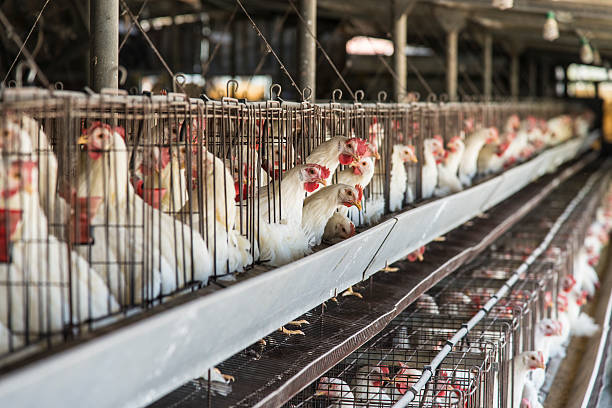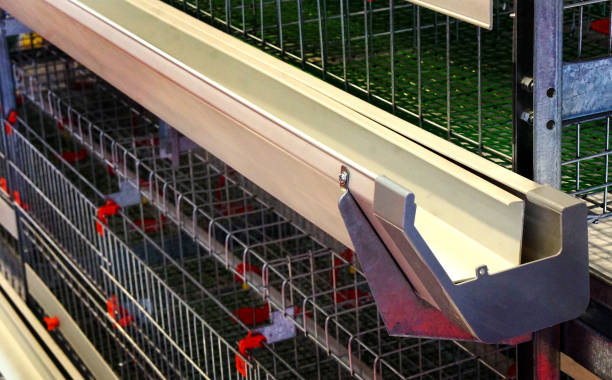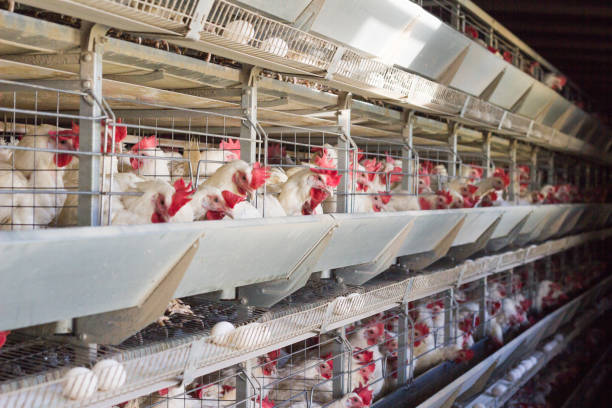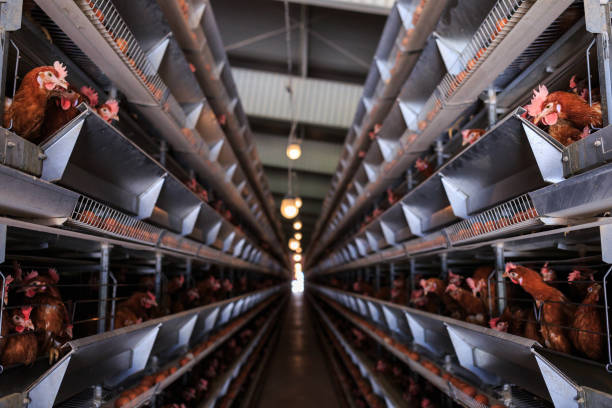
How to Start a Chicken Farm in Alberta | Livi Machinery
How to Start a Chicken Farm in Alberta
Starting a chicken farm in Alberta can be a rewarding and profitable venture, especially with the province’s strong agricultural infrastructure, favorable climate for certain types of poultry farming, and growing demand for locally produced eggs and meat. Whether you’re interested in raising laying hens for egg production or broilers for meat, the right planning and equipment will lay the foundation for long-term success. At Livi Machinery, we’ve helped hundreds of farmers across Canada set up efficient, modern chicken farms using smart, durable solutions designed for cold climates like Alberta’s. In this guide, we’ll walk you through the key steps to start your own chicken farming operation in Alberta — from choosing your model and securing permits, to selecting the right housing and automation systems that make day-to-day management easier and more productive.
What Type of Chicken Farm Fits Your Goals?
Before buying land or building structures, it’s important to clearly define what kind of chicken farming business you want to run. In Alberta, the most common models are egg production (layer farms), meat production (broiler farms), and small-scale or backyard operations often linked to farmer’s markets or local food co-ops. Each model has unique requirements in terms of space, investment, labor, and equipment.
If you’re aiming for high-volume egg production, cage-based layer systems or enriched colony housing are popular choices due to their efficiency and hygiene control. Livi offers automated egg collection systems integrated into our layer cages, which reduce labor significantly and keep eggs clean before they even reach the conveyor belt. On the other hand, if you’re targeting organic or free-range markets, you might consider aviary or floor-raising systems with access to outdoor runs — though these require more labor and careful flock management. For broiler farming, where chickens are raised for meat over 6–8 weeks, deep litter floor systems work well, especially when paired with automatic feeders and drinkers to maintain consistent growth.
Your choice should also factor in market demand. Urban centers like Calgary and Edmonton have strong appetites for fresh, local eggs and antibiotic-free chicken. Partnering with grocery chains, restaurants, or joining provincial marketing boards like Egg Farmers of Alberta can help secure stable off-take agreements. Knowing your end market early on helps refine your breed selection, scale, and biosecurity protocols — all essential components of a sustainable operation.

Legal Requirements, Land Selection, and Climate Considerations

Alberta makes agriculture accessible, but there are rules you need to follow. First, check zoning regulations with your local municipality — not all rural lands permit livestock operations, and some may have restrictions on noise, odor, or manure management. You’ll likely need approval from Alberta Environment and Protected Areas, especially if your farm exceeds certain animal numbers. Registering under the Livestock Identification and Licensing program is mandatory, and depending on your product (eggs vs. meat), you may also need inspection certification from the Canadian Food Inspection Agency (CFIA).
When selecting land, aim for good drainage and proximity to utilities like electricity and water. Being within reasonable distance to feed suppliers, veterinarians, and transport routes cuts down operational costs. A flat or gently sloping terrain works best for construction and waste management. Also, consider future expansion — starting small is wise, but leaving room to grow ensures you don’t outgrow your site too quickly.
One of the biggest challenges in Alberta is the climate — harsh winters with temperatures dropping below -30°C and strong winds can stress birds and increase heating costs. This is where proper housing design and high-quality equipment matter. Insulated poultry houses with controlled ventilation systems prevent drafts while managing humidity and ammonia levels. At Livi, our poultry houses come with thermal panels and smart climate control units that automatically adjust fans and heaters based on real-time conditions inside the barn. We’ve installed dozens of these climate-ready facilities across Western Canada, including in northern Alberta, where extreme cold is a constant concern. Additionally, snow removal planning and windbreaks (like tree lines or fences) help protect buildings and improve airflow patterns around sheds.
Choosing the Right Equipment for Efficiency and Scalability
You can have the perfect location and solid business plan, but without the right equipment, your daily workload skyrockets and your birds’ performance suffers. Modern chicken farming relies heavily on automation to ensure consistency, animal welfare, and profitability. That’s why Livi focuses on providing fully integrated systems tailored to Alberta’s environment.
Let’s break this down by core systems: feeding, watering, egg collection, manure removal, and environmental control. Automated feeding systems eliminate uneven distribution and wasted feed, both of which hurt margins. Our chain-feed lines are rust-resistant and operate smoothly even in sub-zero temperatures thanks to sealed motors and low-friction materials. Similarly, nipple drinking lines deliver clean water directly to every bird, reducing spillage and disease risk. These lines include anti-drip valves to prevent freezing in winter — a common issue in poorly designed systems.
For layer farms, automated egg collection belts minimize breakage and contamination. Eggs roll gently onto conveyors and are moved to packing areas without human handling, improving hygiene and saving hours of labor each day. Manure management is another critical area. Accumulated droppings create ammonia buildup, which harms respiratory health. Our scraper or belt-cleaning systems remove manure regularly, keeping litter dry and air quality safe. Some of our customers integrate composting systems, turning waste into valuable fertilizer — an added revenue stream and eco-friendly bonus.
And let’s not overlook monitoring tools. Today’s successful farms use sensor networks that track temperature, humidity, CO₂ levels, and even feed consumption remotely. With Wi-Fi connected controllers (available on select Livi systems), farmers can receive alerts on their phones and adjust settings from anywhere. This level of control becomes invaluable during sudden cold snaps or equipment failures. Investing in robust, intelligent equipment may cost more upfront, but it pays back in lower mortality rates, higher production, and far less manual work.
Now Is the Time to Build Your Dream Chicken Farm
Starting a chicken farm in Alberta isn’t just about passion — it’s about preparation, resilience, and having the right partners by your side. From picking the right species and setup to navigating regulations and investing in smart, durable equipment, every step counts toward building a profitable and sustainable poultry business. At Livi Machinery, we don’t just sell equipment — we provide full-service support, from layout design and installation guidance to after-sales maintenance and training. Whether you’re launching your first farm or expanding an existing one, we’re ready to help you succeed in Alberta’s dynamic agricultural landscape.
If you’re serious about starting or upgrading your chicken farm, get in touch today. Share your goals, land size, and desired output with us, and we’ll send you a customized solution package — including 3D designs, pricing, and timeline estimates — all free of charge. Let’s turn your vision into reality, one smart poultry house at a time. Reach out now through our website or email us directly — the sooner we talk, the faster you can hatch your dream.
Frequently Asked Questions
What permits do I need to start a chicken farm in Alberta?
You’ll typically need a livestock license, comply with municipal zoning laws, and register with Alberta Agriculture and Irrigation. If you’re selling eggs commercially, joining Egg Farmers of Alberta is required for quota allocation. Meat producers must meet CFIA standards and operate in approved processing facilities.
Can I raise chickens year-round in Alberta’s cold climate?
Absolutely — with proper housing insulation, heating, and ventilation systems. Many successful indoor operations function efficiently throughout winter. Using automated systems from Livi ensures stable conditions regardless of outdoor temperatures.
How much does it cost to start a chicken farm in Alberta?
Costs vary widely. A small starter flock (500–1,000 layers) with basic housing might begin at $30,000–$50,000. Larger commercial setups with automation can range from $100,000 to over $500,000. Equipment longevity and energy efficiency play big roles in long-term ROI.
Do I need previous farming experience?

No, but it helps. Many new farmers learn through workshops, government programs, or mentorships. We offer detailed training and user manuals with every system we install, so beginners can manage operations confidently.
What breeds work best in Alberta?
For egg layers, hybrids like ISA Brown or Lohmann perform well due to their high output and hardiness. Broilers such as Ross 308 grow fast and adapt easily to barn environments. Always source chicks from reputable hatcheries to ensure health and genetic quality.
Is organic chicken farming viable in Alberta?
Yes — demand for organic eggs and meat continues to rise. However, certification requires strict adherence to pasture access, non-GMO feed, and no antibiotics. It takes time and premium investment, but prices and customer loyalty tend to be higher.
How many workers do I need for a medium-sized farm?
With automation, a farm with 5,000–10,000 birds can often be managed by 1–2 people full-time. Tasks like feeding, egg gathering, and cleaning become much easier with automated systems. Additional help may be needed during chick placement or maintenance periods.
Can I use solar power for my chicken farm?
Yes — many Alberta farms are incorporating solar panels to offset electrical costs, especially for lighting, ventilation, and controls. While initial installation is expensive, incentives and reduced utility bills improve payback time.
How do I handle manure from thousands of chickens?
Regular removal via mechanical scrapers or belts keeps the house healthy. Composting manure turns it into nutrient-rich fertilizer you can use on crops or sell locally. Proper storage (covered piles or tanks) prevents runoff and odors.
Where can I get chicks and feed in Alberta?
Major suppliers like Shadybrook Farms provide day-old chicks for both layers and broilers. Feed mills such as United Grain Growers (UGG) and local co-ops supply balanced poultry rations. Bulk ordering saves money and ensures consistency.
